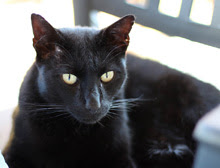This is un canard colvert (green necked duck), what English speakers call a mallard duck. It's a male with its characteristic bright coloration. The female is more mottled, with no green neck or white collar. In recent years, we've seen breeding pairs on the little pond outside our back gate. They nest on the ground under some shrubs at the edge of the water. The only ducklings I've seen in that time are two that Bert brought home. I'm sure the other neighborhood cats and the ducklings' natural predators (foxes and martens) take the rest.
I'm heading out to the market in a neighboring town this morning to get some more mussels for today's lunch. It's a bigger market than the Saturday market in Saint-Aignan and has several fish mongers, so there should be a good choice.







Canard colvert is such an elegant-sounding name. So commonly seen, but always beautiful.
ReplyDeleteAnd yet, you still have ducks...so some ducklings somewhere are surviving and making a pilgrimage to your pond.
ReplyDeleteHe is king of his own island nation.
ReplyDeleteI'm wondering about how you select the mussels. Are there some that you would reject, and some that look like a better choice?
ReplyDeletemitch, Claudette Colbert?
ReplyDeletekiwi, true. There's a pair nearly every year now.
bettyann, lol!
judy, at the market, the fish monger just scoops them up; no selecting. At home, Ken washes them in a tub of water. Live mussels should sink. Floaters get tossed as do mussels that are obviously broken or are open (we tap on the shells to see if they'll close). The rest get cooked. They should open up then, but if any don't, they get tossed, too.
I did not know France had these sorts of ducks.
ReplyDelete